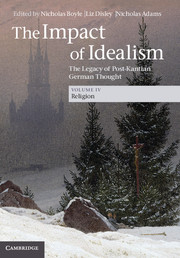Book contents
- Frontmatter
- Contents
- List of Contributors
- Acknowledgements
- List of Abbreviations
- Introduction: the impact of Idealism on religion
- 1 The impact of Idealism on Christology: from Hegel to Tillich
- 2 German Idealism's Trinitarian legacy: the nineteenth century
- 3 German Idealism's Trinitarian legacy: the twentieth century
- 4 Kierkegaard, Hegelianism and the theology of the paradox
- 5 Biblical hermeneutics: from Kant to Gadamer
- 6 Aesthetic Idealism and its relation to theological formation: reception and critique
- 7 The autonomy of theology and the impact of Idealism: from Hegel to radical orthodoxy
- 8 Faith and reason
- 9 Rabbinic Idealism and Kabbalistic realism: Jewish dimensions of Idealism and Idealist dimensions of Judaism
- 10 ‘In the arms of gods’: Schelling, Hegel and the problem of mythology
- 11 Dialectic and analogy: a theological legacy
- Bibliography
- Index
- References
1 - The impact of Idealism on Christology: from Hegel to Tillich
Published online by Cambridge University Press: 05 December 2013
- Frontmatter
- Contents
- List of Contributors
- Acknowledgements
- List of Abbreviations
- Introduction: the impact of Idealism on religion
- 1 The impact of Idealism on Christology: from Hegel to Tillich
- 2 German Idealism's Trinitarian legacy: the nineteenth century
- 3 German Idealism's Trinitarian legacy: the twentieth century
- 4 Kierkegaard, Hegelianism and the theology of the paradox
- 5 Biblical hermeneutics: from Kant to Gadamer
- 6 Aesthetic Idealism and its relation to theological formation: reception and critique
- 7 The autonomy of theology and the impact of Idealism: from Hegel to radical orthodoxy
- 8 Faith and reason
- 9 Rabbinic Idealism and Kabbalistic realism: Jewish dimensions of Idealism and Idealist dimensions of Judaism
- 10 ‘In the arms of gods’: Schelling, Hegel and the problem of mythology
- 11 Dialectic and analogy: a theological legacy
- Bibliography
- Index
- References
Summary
Beginning with a consideration of Hegel's Christology, this essay charts certain stages of Idealism's influence on the Christological debate within the German-speaking world up to the theology of Tillich. Two aims are to the fore. The first is a contribution to historiography. It reconstructs a chapter in the history of theology that is often overlooked in Anglo-American thought, with a particular focus on recent German-language scholarship. The second is a contribution to systematic theology. In the historical positions outlined, problems are raised and solutions are offered that current Christological debate forgets at some cost. This is true as much in questions of methodology as in matters of substance. In debates around Idealism and its impact, it will become clear that Christology is concerned not only with the person and works of Jesus Christ, but also with the very heart of theology, and thus with the categories which form the foundation and core of theological and philosophical thought as a whole. A series of questions comes into view. What are the relations between reason, faith and history, between the absolute and the relative? How are we to reconcile Christianity and other religions? What place can Christianity claim for itself in modernity? In contemporary theology these fundamental questions are rarely considered matters of Christology, but for the Idealist tradition they are, I shall show, essentially bound up with it.
The essay is divided into five sections: (1.1) Hegel's Christology, which situates Christology in the sphere of theoretical reason, redefining it in terms of speculative absolutes; (1.2) its transmission through Philipp Konrad Marheineke, Ferdinand Christian Baur and David Friedrich Strauss; (1.3) responses to it in Isaak August Dorner and Søren Kierkegaard; (1.4) its impact on Emanuel Hirsch and Paul Tillich; and (1.5) its relevance for the present. Reasons of space force certain omissions. The two most obvious are Kant and the tradition of ethical theology that followed him, and Schleiermacher's theology with its grounding in his account of consciousness and its profound historical influence on the theology of mediation. Discussion of Schelling's Christology will be limited to its influence on Tillich.
- Type
- Chapter
- Information
- The Impact of IdealismThe Legacy of Post-Kantian German Thought, pp. 24 - 47Publisher: Cambridge University PressPrint publication year: 2013
References
- 1
- Cited by



